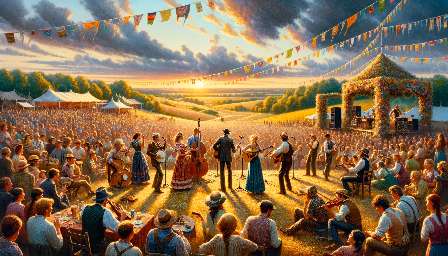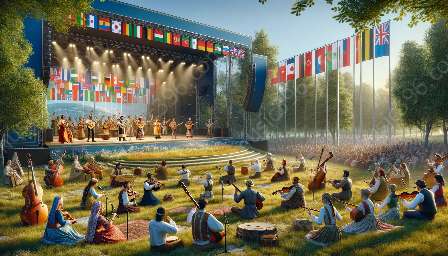Music has long been a powerful force in expressing cultural identities and traditions. Ethnomusicology, as a field of study, delves into the relationship between music and various cultures, exploring the diverse ways in which folk and traditional music reflect the social and historical contexts in which they originate.
Understanding Ethnomusicology
Ethnomusicology is the study of music in its cultural context, encompassing the social, cultural, and historical perspectives of music in societies around the world. It examines the role of music in shaping and reflecting cultural identities, as well as its significance in rituals, ceremonies, and everyday life.
Exploring Folk & Traditional Music
Folk and traditional music, often deeply rooted in oral traditions, are central to the identities of communities and have been passed down through generations. They display a remarkable diversity, embodying the unique sounds and styles of different cultures.
Cultural and Historical Significance
These art forms offer valuable insights into the history, beliefs, and experiences of the people who create and perform them. Folk and traditional music serve as vehicles for storytelling, preserving the collective memory of communities and conveying their values and struggles.
Regional and Global Influences
Furthermore, ethnomusicologists explore the regional and global influences on folk and traditional music, tracing the migration and exchange of musical elements and the impact of colonization and globalization on these traditions.
Collaborative Nature
Throughout history, folk and traditional music have been shaped by interaction and exchange between cultures, fostering rich and diverse musical expressions. Ethnomusicologists study the interconnectedness of musical traditions and the ways in which they continue to evolve and adapt.
Preservation and Revitalization
As communities face modern challenges and changes, the preservation and revitalization of folk and traditional music become crucial. Ethnomusicologists are central to these efforts, working with communities to document, preserve, and revitalize their musical heritage.
Conclusion
Ethnomusicology offers a profound understanding of the rich connections between music, culture, and society, shedding light on the diverse expressions of folk and traditional music across the world. By appreciating the complex narratives and values embedded in these musical traditions, we honor the cultural diversity and resilience of communities through the art of music.
Topic
Preservation and Documentation of Ethnomusicology
View details
Cross-Cultural Understanding through Folk Music
View details
Community Engagement in Folk Music Preservation
View details
Questions
What are the common characteristics of folk music?
View details
How does folk music reflect the culture and traditions of a community?
View details
What are the key instruments used in traditional folk music?
View details
How has technology impacted the preservation of traditional folk music?
View details
What are the social implications of folk music in different communities?
View details
How do folk music festivals contribute to the preservation of traditional music?
View details
What is the significance of folk music in the storytelling traditions of different cultures?
View details
What are the challenges in documenting and archiving traditional folk music?
View details
How does folk music contribute to cross-cultural understanding and harmony?
View details
What are the elements that distinguish folk and traditional music from mainstream music?
View details
How do folk music traditions vary across different regions?
View details
What is the role of women in preserving and performing traditional folk music?
View details
What economic impact does folk music have on the communities where it originates?
View details
What influence does folk music have on contemporary music genres?
View details
How have globalization and modernization affected traditional folk music?
View details
What are the challenges faced in maintaining the authenticity of folk music in a rapidly changing world?
View details
How does folk music help in revitalizing endangered languages?
View details
What are the ethical considerations in recording and sharing traditional folk music?
View details
How has folk music been used in political movements and resistance?
View details
What cultural exchanges have been facilitated through the sharing of traditional folk music?
View details
What is the role of folk music in community identity and solidarity?
View details
What are the ways in which folk music is taught and passed down through generations?
View details
How has migration and diaspora influenced the evolution of folk music?
View details
Why is it important to study folk music in the context of ethnomusicology?
View details
What are the rituals and ceremonies associated with traditional folk music?
View details
How do environmental factors influence the development of folk music?
View details
What are the trends in folk music preservation and revitalization?
View details
How do different cultures perceive and interpret folk music?
View details
What is the role of folklore in shaping traditional music?
View details
How does folk music illustrate the relationship between humans and nature?
View details
What are the characteristics of folk music transmission and dissemination in the digital age?
View details


























